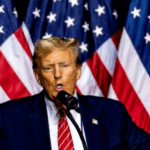As Donald Trump prepares for his upcoming inauguration next month, a range of Fortune 500 companies, crypto firms, and individual billionaires are pledging substantial financial support, with some donations reaching up to $5 million. These contributions, aimed at underwriting the inaugural events, are part of a larger effort to build relationships with the incoming administration.
Amazon, Ford Motor Company, and hedge fund billionaire Ken Griffin are among the companies offering donations at the $1 million level. Cryptocurrency company Ripple is contributing $5 million in XRP digital currency, a move that highlights the growing influence of the crypto industry in Washington. While the swearing-in ceremony itself is funded by taxpayers, the accompanying events, including a candlelight dinner with Trump and exclusive VIP access, are privately financed.
The inaugural committee is offering perks such as access to private dinners with Trump and his wife Melania, and tickets to events like the “Starlight Ball” and the inauguration parade. These high-level donations are seen as a way for corporate interests and wealthy individuals to align themselves with the new administration, according to political analysts.
Michael Beckel, research director at Issue One, explained that large donations are a way to gain access to the president and key officials. “Money is a way of building relationships in Washington,” he said. “Everyone is racing to make friends with the incoming president, who has significant power.”
There are no legal limits on the size of donations to an inaugural committee, allowing companies and individuals to contribute large sums without restrictions. The identities of donors who contribute more than $200 will be disclosed 90 days after the event, following a report filed with the Federal Election Commission.
The crypto industry, in particular, has been eager to engage with the new administration. Coinbase, a major cryptocurrency trading platform, donated $1 million to support the inauguration, reflecting its goal of establishing regulatory clarity for digital currencies. Robinhood, an online trading platform, has also pledged $2 million, aiming to influence policies that promote free markets and consumer choice.
Companies like Ford and General Motors, which supported Trump’s first inauguration in 2017, are continuing their contributions this year, with each donating $1 million. These companies are hoping for favorable policies, such as trade deals and tax regulations, under Trump’s leadership.
In addition to corporate donations, individual supporters are also giving generously. Sheldon Adelson, a major donor to Trump’s first inauguration, was the largest individual contributor with $5 million in 2017. His widow, Dr. Miriam Adelson, is helping finance this year’s event.
The high-stakes nature of these donations underscores the deep ties between big business and politics, with many contributors seeking access to power in the new administration. As the inauguration approaches, these donors will enjoy unparalleled access to the president and his team, highlighting the significant influence of money in shaping the political landscape.









